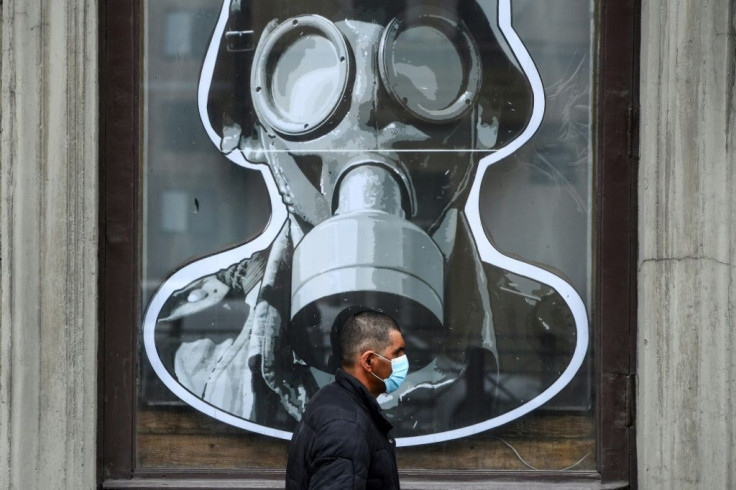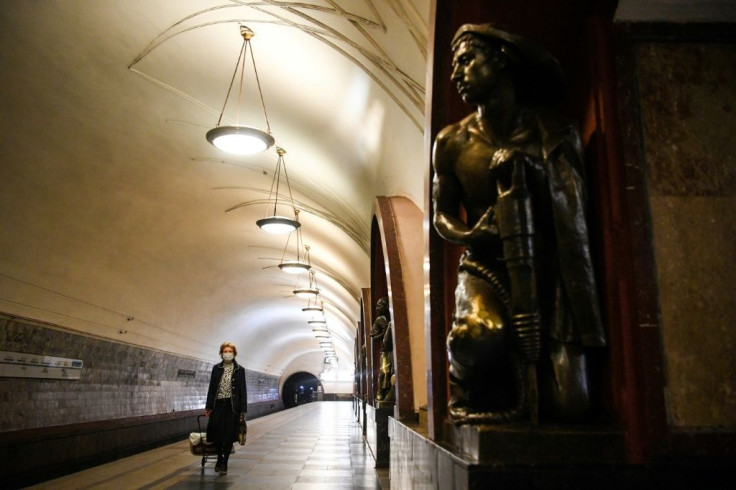Putin Eases Russia's Stay-at-home Orders As Cases Soar
President Vladimir Putin on Monday said stay-at-home orders for most workers in Russia would be eased this week even as the country registered a record increase in new coronavirus infections.
With more than 220,000 confirmed cases and a steady surge of more than 10,000 new coronavirus cases every day, Russia now ranks fourth in a global tally of total infections after the United States, Spain and Britain.
Despite virus figures that suggest the pandemic in Russia shows no sign of slowing, Putin announced that the country's "non-working" period to slow the pandemic would end on Tuesday.
The Kremlin introduced the measures in late March, saying Russians not working in essential jobs would have to stay at home but still receive their salaries as part of sweeping efforts to contain the virus.

The move brought uncertainty to the economy already grappling with low oil prices, with business owners struggling to pay full salaries to employees while shutting their doors to customers.
"Starting from tomorrow, May 12, the national period of non-working days will be over for all sectors of the economy," Putin said during a meeting with officials responsible for the country's virus response.
The president said that Russia's regions, which were given leeway to introduce different anti-virus measures, would be able to keep in place any restrictions necessary to contain the pandemic.
The president's announcement, broadcast on state-run television, comes after Russia registered a record number of daily cases with more than 11,000 people testing positive over the last 24 hours.

Officials have said the rise of the daily rate is in part due to aggressive testing, even of those showing no symptoms.
The government says it has carried out more than 5.6 million tests and Putin on Monday vowed to double capacity to 300,000 daily tests by mid-May.
Health officials Monday said Russia has a total of 221,344 coronavirus infections, with around half of the total cases in the capital.

Moscow Mayor Sergei Sobyanin last week extended a lockdown in the capital until the end of May and ordered residents to wear masks and gloves on public transport.
Yet Sobyanin has also said that some industries and construction sites can begin work this week.
Putin on Monday said that Russia had used the self-isolation period to prepare its healthcare system, increasing the amount of hospital beds and saving "many thousands of lives".
This "allows us to begin a gradual lifting of restrictions", he said.
Russia's reported mortality rate is much lower compared to other European countries hit hard by the pandemic, with 94 new deaths and 2,009 dead from the coronavirus as of Monday.
Yet critics have cast doubt on the numbers, accusing the authorities of under-reporting deaths.
With the epicentre of the pandemic in and around Moscow, some regions beyond the capital have already begun to relax the restrictions, which have seriously affected the economy.
"It is in the interest of all of us for the economy to return to normal quickly," Putin said, adding that construction, agriculture and energy should be restarted first.
"The epidemic and associated restrictions have had a strong impact on the economy and hurt millions of our citizens," he told officials during the meeting.
As people begin going back to work, mass events are still suspended and "strict sanitation demands" must be observed, Putin said.
The pandemic poses a serious political threat to Putin with the president's approval ratings at historic lows and mass events, including a national ballot and a landmark military parade, cancelled due to the virus.
Russia's neighbours Ukraine and Georgia began to relax restrictions Monday, while Kazakhstan lifted its state of emergency.
© Copyright AFP 2024. All rights reserved.





















